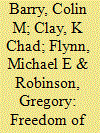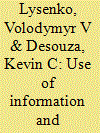|
|
|
Sort Order |
|
|
|
Items / Page
|
|
|
|
|
|
|
| Srl | Item |
| 1 |
ID:
134151


|
|
|
|
|
| Publication |
2014.
|
| Summary/Abstract |
Allowing or restricting foreign movement is a crucial policy choice for leaders. We argue that freedom of foreign movement reduces the level of civil unrest under non-democratic regimes, but only in some circumstances. Our argument relies on the trade-offs inherent in exit and voice as distinct strategies for dealing with a corrupt and oppressive state. By permitting exit and thereby lowering its relative costs, authoritarians can make protest and other modes of expressing dissatisfaction less attractive for potential troublemakers. Liberalizing foreign movement can thus function as a safety valve for releasing domestic pressure. But the degree to which allowing emigration is an effective regime strategy is shaped by the economic opportunities offered by countries receiving immigrants. We find that freedom of foreign movement and the existence of economic opportunities abroad reduce civil unrest in non-democratic states. However, at high levels of unemployment in the developed world, greater freedom of foreign movement actually increases protest.
|
|
|
|
|
|
|
|
|
|
|
|
|
|
|
|
| 2 |
ID:
186632


|
|
|
|
|
| Summary/Abstract |
Despite the extensive literature on the nexus between civil society and democratization in non-democratic regimes, most existing scholarship focuses on politically oriented and claim-making civil society organizations. While these accounts provide useful insights, they appear to rely on Western-centric understandings of civil society. Undoubtedly, little space exists in non-democratic regimes within which civil society organizations may engage in overt political activism due to governmental restrictions. Notwithstanding these restrictions, there are politically less threatening social arenas, where it is possible to identify informally organized civil society initiatives with the potential to redefine and influence long-term state–society relations. This article argues that what we might think of as civil society initiatives in non-democratic regimes cannot be satisfactorily understood through the lens of Western-centric understandings of civil society. Instead, we should focus on informal civil society initiatives. These processes will be illustrated through the case study of mahalla institutions in Uzbekistan.
|
|
|
|
|
|
|
|
|
|
|
|
|
|
|
|
| 3 |
ID:
188956


|
|
|
|
|
| Summary/Abstract |
The resilience of non-democratic regimes in the past decades demonstrates that some authoritarian regimes have figured out ways to consolidate regime support without democratic elections. Hong Kong is a remarkable case of “legitimacy without democracy” as the system of government enjoyed a certain level of legitimacy since colonial days without being democratically elected. Using Hong Kong as a case and based on data from several waves of Asian Barometer Survey (ABS), this study analyzes the impact of citizens’ evaluation of the economic conditions, perception of freedoms, perceived procedural justice and institutional trust, and stability concerns on diffuse regime support in Hong Kong. There are three key findings of this study. First, economic performance is not a significant predictor of diffuse regime support in the case of Hong Kong, whereas, second, institutional trust and perceived civil liberties are. Finally, we found indirect evidence for the role of stability in shaping regime support, although its importance seems far less important than institutional trust and civil liberties
|
|
|
|
|
|
|
|
|
|
|
|
|
|
|
|
| 4 |
ID:
139272


|
|
|
|
|
| Summary/Abstract |
Information and communication technology have played an important role in the tactics of uprisings against non-democratic regimes worldwide. However, there has been little attention paid in studies so far of how authorities in those countries employ such information and communication technology. In this article we examine the evolution of such tactics as employed by one of the most ingrained authoritarian regimes—that of Belarus—during the decade 2001 to 2010. The political opposition's responses to the authorities' countermeasures are also investigated, followed by an analysis of the co-evolution of these opponents' tactics.
|
|
|
|
|
|
|
|
|
|
|
|
|
|
|
|
|
|
|
|
|